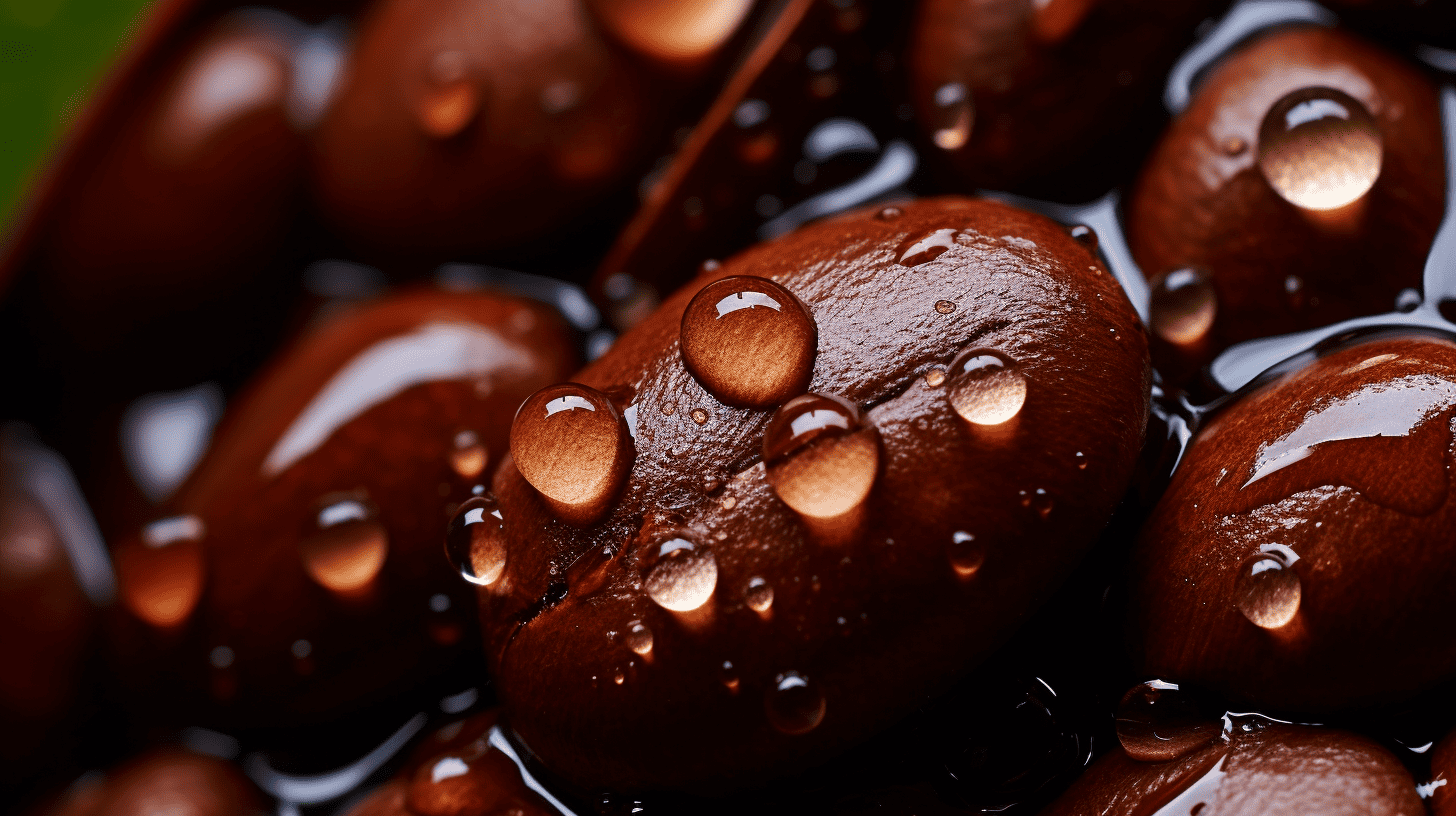Plain coffee is a low-calorie beverage many people enjoy as part of their daily routine. However, coffee calories with sugar can make you turn your head. Just one teaspoon of sugar adds approximately 16 calories to your cup of joe. Other common ingredients added to coffee that can contribute to its calorie count include cream, milk, and flavored syrups.
The number of calories in a cup of coffee with sugar can vary depending on the amount of sugar and other ingredients added. For example, a small latte from your favorite coffee shop could contain up to 200 calories or more if it’s made with whole milk and flavored syrup.
Coffee Drinks and Their Calories
| Type of Coffee Drink | Calories per 8 oz | Carbohydrates per 8 oz |
|---|---|---|
| Black Coffee | 2 | 0 |
| Espresso | 20 | 0 |
| Americano | 2 | 0 |
| Latte | 120-180 | 12-17 |
| Cappuccino | 80-120 | 6-8 |
| Mocha | 210-340 | 25-35 |
| Frappuccino | 200-400 | 30-70 |
Please be aware: The tally of calories and carbohydrates can differ based on the specific brand and variety of coffee utilized. The table above offers an estimated calorie and carbohydrate count for an 8 oz serving of various types of coffee beverages, encompassing the most commonly ordered drinks in coffee shops.
Consuming too many calories from sugary drinks like coffee can lead to weight gain and other health issues. Being mindful of the calorie content in your coffee can help you make healthier choices and maintain a balanced diet.
If you’re looking for ways to cut back on the calories in your coffee, there are several options available. One simple solution is to switch from regular sugar to a low-calorie sweetener like stevia or monk fruit extract. These sweeteners provide the same sweetness as sugar but without all the extra calories.
Another option is to use non-dairy milk alternatives like almond or soy milk instead of traditional dairy products. These alternatives are lower in calories and fat than regular milk, making them a healthier choice for those watching their waistline.
Some coffee shops offer “skinny” versions of popular drinks that are made with skim milk and sugar-free syrups. These options are often lower in calories than their traditional counterparts and can be a great way to indulge in your favorite drink without all the guilt.
Understanding Coffee Calories with Sugar
Coffee is a popular beverage that many people enjoy daily. It provides a quick energy boost and can be customized to suit individual preferences. However, adding sugar to coffee can significantly increase the calorie count of your drink. One teaspoon of sugar contains around 16 calories, so adding multiple teaspoons can quickly add up.
For example, a 12-ounce latte made with whole milk and flavored syrup contains approximately 250 calories. Adding two teaspoons of sugar to this drink will increase the calorie count by an additional 32 calories. This may not seem like much, but consuming several sugary coffee drinks throughout the day can quickly add up the extra calories.
Weight Gain from Sugary Coffee Drinks
Consuming too many calories from sugary coffee drinks can contribute to weight gain and other health issues. According to a study published in the American Journal of Clinical Nutrition, consuming sugary beverages increases the risk of obesity and type 2 diabetes.
Furthermore, research has shown that liquid calories are less satisfying than solid food calories. This means that drinking sugary coffee drinks may not provide the same satiety level as eating solid foods with similar calorie counts. As a result, people who consume high-calorie beverages may consume more overall calories throughout the day.
Alternatives to Sugary Coffee Drinks
Fortunately, there are alternatives to sugary coffee drinks that can help reduce calorie intake without sacrificing flavor. One option is to use natural sweeteners such as honey or maple syrup instead of refined sugar.
Another alternative is choosing low- or zero-calorie sweeteners such as stevia or monk fruit extract. These sweeteners provide sweetness without adding any additional calories or negatively impacting blood sugar levels.
Choosing non-dairy options such as almond or oat milk can also help reduce calorie intake in coffee drinks while still providing creaminess and flavor.
High-Calorie Additions in Sweetened Coffee Drinks
Sweetened coffee drinks have become a staple in the diets of many individuals. Whether it’s a morning pick-me-up or an afternoon treat, these beverages are often loaded with sugar and calories. This section will discuss some of the high calorie additions found in sweetened coffee drinks.
Creamers: A Common Culprit
One of the most common additions to sweetened coffee drinks is creamer. While creamer can add flavor and creaminess to coffee, it can also significantly increase calorie count. Many creamers are made with high fructose corn syrup and hydrogenated oils, both sources of empty calories that offer no nutritional value.
Just one tablespoon of non-dairy creamer can contain up to 40 calories and 3 grams of fat. If you enjoy multiple cups of coffee per day with added creamer, those calories can quickly add up.
Caramel Syrups and Other Flavorings
Another way that sweetened coffee drinks can pack on the pounds is through flavored syrups such as caramel or vanilla. These syrups are often made with high amounts of sugar and artificial flavors.
For example, a grande (16 oz) Caramel Frappuccino from Starbucks contains a whopping 420 calories and 66 grams of sugar! That’s more than double the recommended daily intake for added sugars, according to the American Heart Association.
Fat Content in Dairy-Based Creamers
Dairy-based creamers may seem like a healthier option than their non-dairy counterparts, but they still contribute to the high calorie count in sweetened coffee drinks. One tablespoon of half-and-half contains around 20 calories and 1 gram of saturated fat.
If you add several tablespoons of half-and-half or heavy cream to your coffee throughout the day, those extra calories and saturated fats can quickly add up. Consuming too much-saturated fat has been linked to an increased risk of heart disease and other health problems.
Calories in Plain and Flavored Iced Coffee
Plain Iced Coffee vs. Flavored Iced Coffee
There are two main categories: plain and flavored. While both can be refreshing and delicious, their calorie count differs. Plain iced coffee is typically made with just coffee and ice, making it a low-calorie option. On the other hand, flavored iced coffee often contains added sugars and syrups, which can significantly increase its calorie count.
Calories in Plain Iced Coffee
Plain iced coffee is a great choice for those who want to enjoy the taste of coffee without consuming too many calories. A typical serving of plain iced coffee contains around 2 calories per ounce, meaning an 8-ounce cup of plain iced coffee will have approximately 16 calories.
However, if you add cream and sugar to your plain iced coffee, the calorie count will increase significantly. Just one tablespoon of sugar adds around 50 calories to your drink, while a tablespoon of cream adds about 52 calories. If you prefer plain iced coffee sweetened or creamy, consider using natural sweeteners like stevia or almond milk instead.
Calories in Flavored Iced Coffee
Flavored iced coffee is a popular choice for those who want to add flavor to their drink. However, many flavored options contain added sugars and syrups that can increase their calorie count significantly. For example, a popular caramel-flavored latte from a well-known chain contains around 400 calories per serving.
If you’re looking for a lower-calorie option, consider sugar-free syrups or natural sweeteners like honey or maple syrup. These options can help reduce the overall calorie count while still providing some sweetness.
Calories in Coffee with Milk and Sugar
Did you know that adding whole milk and sugar to your coffee can make it a high calorie drink? Whole milk is higher in fat than skim or low-fat milk, which means it has more calories. And sugar is a type of carbohydrate that also adds calories to your drink. When you combine these two ingredients, you can end up with a drink that has as many calories as a small meal!
So, if you’re trying to watch your weight or be mindful of your calorie intake, limiting the amount of whole milk and sugar you add to your coffee is a good idea. Instead, try using skim or low-fat milk and sweeteners like honey or stevia, which have fewer calories. That way, you can still enjoy your coffee without worrying about the extra calories.
Many people enjoy adding milk and sugar to their coffee for added flavor, but these additions can also significantly increase the calorie count. For example, a 16-ounce latte made with whole milk and two teaspoons of sugar contains around 250 calories. This is because whole milk has a higher fat content than other types of milk, which contributes to the high calorie count.
However, there are ways to reduce the number of calories in your coffee while still enjoying its delicious taste. Nonfat and steamed milk are lower in calories than whole milk, with around 150 calories in a 16-ounce latte with two teaspoons of sugar. While this is still a significant amount of calories, it is less than what you would consume if you used whole milk.
Skimmed Milk and Almond Milk: Low-Calorie Options
For those looking for a low-calorie option, a 16-ounce latte made with skimmed milk or almond milk and two teaspoons of sugar contains around 100-120 calories. Skimmed milk has removed most of its fat, making it an excellent choice for those watching their calorie intake. Almond milk is also low in calories and provides a unique nutty flavor that pairs well with coffee.
It’s important to note that the number of calories in your coffee can vary depending on how much sugar you add. Two teaspoons of sugar contain approximately eight grams of sugar and around 30 calories. If you prefer sweeter coffee, consider using artificial sweeteners or gradually reducing the sugar until you get used to drinking your coffee without any added sweetness.
Calories in Coffee Syrups and Other Additives
Syrups and other additives are a popular way to flavor coffee, but they can also add a significant amount of calories. It’s essential to be mindful of the amount and type of additives used in coffee drinks to avoid consuming excess calories.
Sugar-free syrups as an alternative:
Some coffee shops offer sugar-free syrups as an alternative to traditional syrup options. These sugar-free syrups can help reduce the calorie count of a coffee drink without sacrificing flavor. However, it’s important to note that some sugar-free syrups may contain artificial sweeteners, which have been linked to negative health effects in some studies.
Calories in traditional syrup options:
A typical syrup pump contains around 20-25 calories, but this can vary depending on the brand and flavor. For example, a pump of caramel syrup contains around 25 calories, while a pump of vanilla syrup contains around 20 calories. If you add multiple pumps of syrup or opt for larger sizes, the calorie count can quickly increase.
Other additives that contribute to calorie count:
In addition to syrups, other additives such as whipped cream and caramel drizzle can also contribute to the calorie count of a coffee drink. A dollop of whipped cream adds around 50-60 calories, while a drizzle of caramel sauce adds around 30-40 calories. If you want to reduce your calorie intake from coffee drinks, it’s best to skip these extras or ask for them on the side to control how much is added.
Choosing low-calorie flavorings:
Plenty of low-calorie options are available if you still want to add flavor without adding extra calories. Flavorings like cinnamon or cocoa powder can add depth and complexity without adding additional calories. Some coffee shops offer natural sweeteners like honey or agave nectar as an alternative.
Comparing the Calories in Different Coffee Drinks
Different Coffee Drinks and Their Calorie Content
Brewed coffee is the most popular coffee drink in the world. It’s simple, easy to make, and has a low-calorie count. A cup of black coffee contains only 2 calories on average. However, not everyone likes their coffee black. Some prefer adding sugar, cream, or other flavorings to their coffee drinks. As a result, the calorie content of different coffee drinks can vary significantly.
Espresso-Based Drinks vs Brewed Coffee
Starbucks is one of the most popular coffee chains in the world. They offer a wide variety of espresso-based drinks such as lattes, cappuccinos, macchiatos, and Americanos. These drinks tend to have higher calorie counts than brewed coffee due to added milk and sugar.
For instance, a 16-ounce cappuccino from Starbucks contains around 120 calories while a 16-ounce latte with whole milk has approximately 250 calories. Similarly, a 16-ounce mocha Frappuccino with whipped cream contains about 400 calories.
It’s important to note that these calorie counts are based on standard recipes and serving sizes at Starbucks. If you customize your drink by adding extra shots of espresso or more syrup pumps, the calorie count will increase accordingly.
Sugar and Cream Additions
The amount of sugar or cream added to your coffee can also affect its calorie content significantly. For example, a teaspoon of sugar adds about 15 calories while a tablespoon of heavy cream adds around 50 calories.
If you’re trying to watch your calorie intake but still want some sweetness in your coffee drink, consider using natural sweeteners like honey or maple syrup instead of refined sugar. You can also opt for low-fat milk or almond milk instead of heavy cream.
Checking Calorie Counts
If you’re concerned about the calorie content of your favorite coffee drinks but don’t know where to start, several resources are available online. Starbucks, for example, provides nutritional information for all its drinks on its website. You can also use mobile apps like MyFitnessPal or Lose It! to track your calorie intake and adjust as needed.
Healthy Coffee Intake and Monitoring Calorie Intake
Black Coffee: A Good Choice for Monitoring Calorie Intake
For people conscious of their calorie intake, black coffee is a good choice. Unlike other types of coffee that contain added sugar or cream, black coffee has zero calories. This makes it an excellent option for those who want to limit their calorie intake while still enjoying their daily dose of caffeine.
Caffeine and Weight Loss
Aside from being a low-calorie beverage, coffee also contains caffeine which can help boost metabolism and aid in weight loss. According to a study published in the International Journal of Epidemiology, drinking coffee can decrease the risk of obesity by up to 8% per cup. The study also found that caffeine can increase energy expenditure and fat oxidation, making it easier for the body to burn calories.
The Importance of Monitoring Calorie Intake
Monitoring calorie intake is essential for maintaining a healthy weight and diet. Consuming more calories than your body needs can lead to weight gain and other health problems such as heart disease, diabetes, and high blood pressure. Keeping track of your calorie intake ensures you consume enough nutrients without going overboard on calories.
Choosing Smaller Size Options
Choosing smaller size options can help reduce calorie intake significantly. For example, a tall (12 oz) Starbucks Caffè Latte with whole milk contains 150 calories while a venti (20 oz) contains 250 calories. Choosing the smaller size option saves you money and helps keep your calorie intake in check.
Protein-Rich Foods with Coffee
Pairing protein-rich foods with your cup of coffee can also make it a healthier choice. Protein takes longer to digest than carbohydrates or fats, which keeps you feeling full for extended periods. This reduces the likelihood of snacking on unhealthy foods throughout the day.
Mindful Eating Habits
While black coffee is a good choice for monitoring calorie intake, people should also be mindful of the type and amount of food they consume alongside their coffee intake. Eating a lot of high-calorie foods such as pastries or donuts with your coffee can quickly add up to a lot of calories in a day. Choosing healthier options such as fruits, vegetables, nuts, and seeds can help maintain overall health.
The Risks of Consuming High-Calorie Sweetened Coffee Drinks
Weight Gain and Obesity
Consuming high-calorie sweetened coffee drinks can lead to weight gain and obesity. These drinks often contain significant added sugars, providing empty calories that contribute to weight gain. The high caffeine content in these beverages can increase appetite and lead to overeating.
According to a study published in the Journal of Public Health Dentistry, individuals who consume sugary drinks regularly are more likely to be overweight or obese than those who do not. The study also found that people who drink sugary beverages consume more calories overall, leading to an increased risk of weight gain.
Type 2 Diabetes
Consuming too much sugar in coffee can increase the risk of developing type 2 diabetes. This is because high levels of sugar in the blood can cause insulin resistance, which makes it difficult for the body to regulate blood sugar levels.
A study published in the American Journal of Clinical Nutrition found that consuming one or more servings per day of sweetened beverages was associated with an increased risk of developing type 2 diabetes. The study also found that replacing just one serving per day with water or unsweetened tea could significantly reduce this risk.
Dental Problems
Sweetened coffee drinks often contain high amounts of added sugars, which can cause tooth decay and other dental problems. When sugar is consumed, it reacts with bacteria present in the mouth to produce acid that erodes tooth enamel over time.
According to research by the National Institute of Dental and Craniofacial Research (NIDCR), consuming sugary drinks regularly increases the risk of cavities and other dental problems. The NIDCR recommends limiting the consumption of sugary beverages like sweetened coffee drinks as part of a comprehensive oral health plan.
Heart Disease and Other Chronic Health Conditions
Regularly consuming high-calorie sweetened coffee drinks can also increase the risk of heart disease and other chronic health conditions. This is because these drinks often contain high levels of saturated fat, which can contribute to plaque buildup in the arteries.
A study published in the Journal of the American Heart Association found that consuming sugary beverages regularly was associated with an increased risk of coronary heart disease. The study also found that replacing just one serving daily with water or unsweetened tea could significantly reduce this risk.
Watch Your Coffee Calories with Sugar
The Impact of Sugar on Your Coffee Calories
Sugar is a common addition to coffee, but it can significantly impact the calorie count of your beverage. Just one teaspoon of sugar contains about 16 calories. If you add two teaspoons of sugar to your coffee every day for a year, you could consume an extra 11,680 calories. That’s equivalent to nearly three pounds of body weight!
It’s essential to watch your sugar intake in coffee if you’re trying to maintain a healthy diet and avoid unnecessary weight gain. Here are some tips for reducing your coffee calories with sugar:
Use Artificial Sweeteners Instead
Artificial sweeteners are an excellent alternative to sugar to reduce your calorie intake without sacrificing sweetness. They contain little or no calories and do not affect blood sugar levels like regular sugar.
Several types of artificial sweeteners are available, including aspartame, saccharin, sucralose, and stevia. Each has its unique taste and level of sweetness, so experiment with different options until you find one that suits your preferences.
Cut Back Gradually
If you’re used to adding multiple teaspoons of sugar to your coffee every day, cutting back all at once can be challenging. Instead, try reducing the amount gradually over time.
Start by using half the amount of sugar you usually would for a week or two before cutting back further. This method allows your taste buds time to adjust gradually without feeling deprived.
Switch Up Your Coffee Order
If you enjoy flavored lattes or cappuccinos with added syrup or whipped cream, consider switching up your order for something less sugary.
Opt for black coffee or add a splash of milk or creamer instead of syrup. You’ll still get the caffeine boost without all the added sugars.
Be Mindful When Adding Sugar
When adding sugar to your coffee, be mindful of how much you’re using. Use measuring spoons to ensure you’re not adding more than necessary.
If you’re out and about, consider bringing your sugar packets. That way, you can control how much sugar goes into your coffee, even when you’re on the go.
Conclusion: Watch Your Coffee Calories with Sugar
In conclusion, it is important to be mindful of how much sugar we add to our coffee drinks. Just a few tablespoons of sugar can quickly add up to many calories, especially when combined with other high calorie additives like syrups and whipped cream.
When ordering coffee at popular chain coffee shops in the South, paying attention to the total calorie count listed on the menu is essential. Many sweetened coffee drinks can contain half or more of your recommended daily calorie intake.
To monitor your calorie intake from coffee, try switching to plain black coffee or adding just a small amount of milk or creamer. If you choose to indulge in a sweetened coffee drink, consider ordering a smaller size and asking for less syrup or sugar.
By being aware of the calories in our coffee drinks and making small changes where possible, we can still enjoy our favorite beverages without compromising our health goals. So next time you reach for that sugary cup of joe, remember to watch your coffee calories with sugar.
FAQ for Coffee Calories with Sugar: Know Your Drink’s Nutritional Facts:
Q: How many calories does a cup of black coffee contain? A: Typically, a cup of black coffee holds around 2 calories.
Q: What’s the calorie content of a cup of coffee with cream and sugar? A: This can differ based on the cup size and quantities of cream and sugar. A standard 8-ounce coffee cup with cream and sugar usually contains between 150 and 330 calories.
Q: How many calories are in a tablespoon of cream? A: About 44 calories are found in a tablespoon of cream.
Q: What’s the calorie count of a teaspoon of sugar? A: A teaspoon of granulated white sugar contains approximately 16 calories.
Q: Are cream and sugar unhealthy? A: Cream and sugar, which contain saturated fats and added sugars, can be detrimental to health if consumed excessively.
Q: Can you suggest some low-calorie sweeteners for coffee? A: Some alternatives for low-calorie sweeteners include stevia and Splenda.
Q: What are some low-carb milk alternatives for coffee? A: Some low-carb milk substitutes include unsweetened almond milk, soy milk, oat milk, cashew milk, coconut milk, pea-protein milk, and hemp milk.
Q: How many calories are there in a latte? A: The calorie count can vary depending on the cup size and the amount of milk and sugar. A 16-ounce latte made with 2% milk typically contains between 120 and 180 calories.
Q: What’s the calorie count in a cappuccino? A: This varies depending on the cup size and the amount of milk and sugar. An 8-ounce cappuccino made with 2% milk usually has between 80 and 120 calories.
Q: How many calories does a mocha contain? A: This varies based on the cup size and the amount of milk and sugar. A 16-ounce mocha made with 2% milk usually has between 210 and 340 calories.
Q: What’s the calorie content of a frappuccino? A: This can vary depending on the cup size and the amount of milk and sugar used. A 16-ounce frappuccino typically contains between 200 and 400 calories.





Leave a Reply